News and Events
- Changes in Travel Behaviour: Exploring Whether Physical Distance Still Matters
- New Teacher Joins CDIC Academic Team
- 3rd UCD China Joint Colleges Workshop
- UCD showcases Transnational Education leadership in China during Taoiseach’s official visit
- Chang’an University President Leads Senior Delegation to UCD for Joint Management Committee Meeting
- Seminar on Research Collaboration between Chang’an University and University College Dublin
- Dr Miguel Trejo Rangel Joins CDIC
- New CDIC–UCD Research Published in Ecological Indicators Journal
- Bridging the Vocabulary Gap in EAP: A BDIC, CDIC & GDIC Perspective
- Beyond Traffic Jams and Trams: What Makes Transport Truly “Critical”
- CDIC Delegation Visit
- Professor Calvin Chung: Critical Reflections on the Green Transition and New Urban Patterns
- UCD/CDIC teacher promotes UCD programmes in India
- CDIC-TCPEP Lecture Series is back!
- CDIC celebrates Mid-Autumn Festival
- CDIC Cultural Meet-Up
- Scarfing Ceremony September 2025
- VR for Travel Safety: A UCD Belfield Campus Case Study from CDIC/UCD Teachers
- Celebrating Indian Independence Day at UCD
- Dr Ana Peric Momcilovic receives Swiss National Science Foundation grant for research on healthy communities
- Jinghao's Journey to Studying Supply Management Abroad
- Two Weeks of Learning and Exploration: CJCO Students at UCD
- Stepping into the Field: Hayi's Canadian Internship Experience
- From Research to Road Trips
- Chasing Goals, Building Bridges, and Exploring New Horizons
- Congratulations to the Graduating Cohort 2022
- Dr. Caterina Villani Appointed Judge for RTPI Awards for Research Excellence
- Strengthening Ties: Welcoming Chang'an University Delegation to UCD
- Pandemic rural residential mobilities? Towards an understanding of who moved house and why in rural Ireland
- Dr Luke Kelleher co-leads a new EPA-funded project
- Exciting International Collaboration with Kazakhstani Exchange Students
- The Long Journey Across Cultures: My Intercultural Adventure from CDIC to Chang’an University by Zhao Ruixiang
- CDIC Team Secures ReClaim Funding to Enhance Inclusion for Migrant Researchers
- Dr Jufan Zhang is the finalist of 2024 UCD Research Impact Case Study Competition
- New Lecturer Joins Civil Engineering Infrastructure Programme
- 2nd China Joint Colleges Workshop
- Salt Medical and Dr Jufan Zhang Join Forces to Revolutionise Nano Manufacturing of Medical Devices
- President Feely Visits CDIC
- 2024 News Archive
- 2023 News Archive
Beyond Traffic Jams and Trams: Dr. Wojciech Kębłowski on What Makes Transport Truly “Critical”
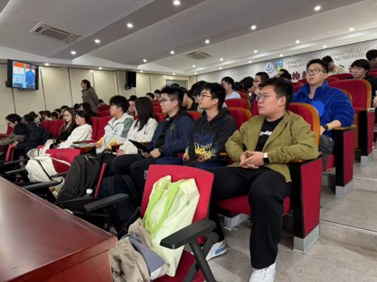
Written by PLAN4007 Student Group 7, UCD Xianqi Dai, Ruiheng Li, Kangrui Jia, Rui Nie, Wenjun Xiao, Jiakai Lou, Yuhui Guo, Wen Ge, Yifei Hou, Zihan Wang, Yuxuan Chang, Xuanlai Tang, Yi Miao, Wenbo Wei, Tianle Yang
About the TCPEP Lecture Series 2025 ‘Transport, Development and Society’
Organised by Dr. (opens in a new window)Yunpeng Zhang and Dr. (opens in a new window)Caterina Villani, the CDIC-TCPEP Lecture Series brings together leading academics and practitioners to explore critical issues at the intersection of urban planning, development, and transport. Now in its second edition, Transport, Development and Society, the series gives undergraduate students a unique opportunity to engage with current research and professional practice, while also fostering research dialogue among CDIC TCPEP faculty and PhD students. Delivered as part of the PLAN4007W Smart Cities and Transport module, each lecture encourages students to reflect on emerging themes such as mobility, land use, and sustainability. Student groups then prepare a blogpost linking the speaker’s insights to course discussions and wider urban debates.
When the WH-building’s lecture hall lights dimmed, Dr. Wojciech Kębłowski from the University of Hong Kong opened with a question that made everyone pause:
“Are our cities really moving forward—or just moving faster without direction?”
It was a thought-provoking start to his talk on What does it mean to be critical about transport, reminding students that mobility is never just about vehicles and speed. Instead, it is about people—their everyday journeys, choices, and struggles for access.
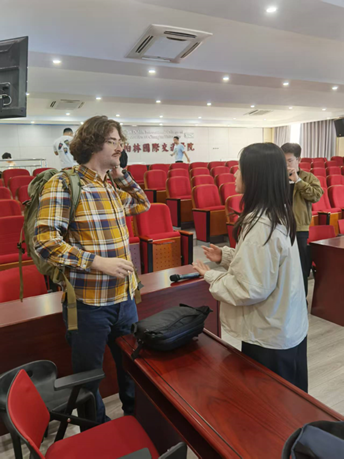
Group members engage with Dr. Kębłowski after the talk.
Dr. Kębłowski, an assistant professor at HKU and one of the leading voices in critical urban mobility studies, explained that to be “critical” does not mean to complain or to reject technology. It means to think deeper—to question the assumptions behind policies, to reveal who benefits, and to notice who is left out. “Transport,” he said, “is always political—it shapes who gets to move and who must wait.”
His lecture invited students to rethink five dimensions of transport: how knowledge is produced, how policies are made, how infrastructures are built, how labour is organized, and how everyday practices unfold. He also mentioned that cities in the Global South often passively accept the "success paradigm" defined by the West, while ignoring the local experiences of the South. This perpetuates the inequality in knowledge production and needs to be broken.
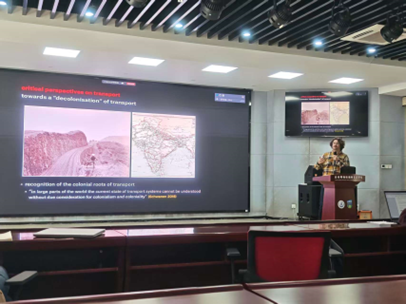
Dr. Kębłowski’s introduction on the colonial roots of transport in the world.
During the Q&A session, our Group asked Dr. Kębłowski about his impressions of transport in Xi’an. He smiled and shared a vivid memory: “I took a ride in a tiny electric tricycle near the city wall—probably not an official taxi—but it was the most efficient and personal trip I had! The driver talked about the best shortcuts and where tourists get stuck in traffic. It reminded me that mobility isn’t only about formal systems; it’s about people improvising, adapting, and making the city work in their own way.”
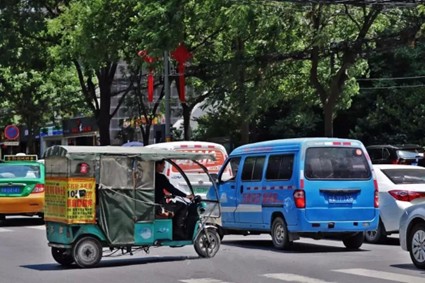
A motorized tricycle near Xi’an’s city wall — a vivid example of the city’s informal transport network that inspired Dr. Kębłowski’s reflections on everyday mobility and social inclusion. (shot by our group member)
This anecdote captured the spirit of his research perfectly. Behind every metro line or app-based service lies a complex web of social relations and informal solutions that keep cities moving.
For students in the Smart Cities and Transport course, Dr. Kębłowski’s insights carried a timely message: a truly smart city is not defined by algorithms or electrified fleets but by fairness, inclusion, and empathy. Critical thinking keeps innovation humane—it ensures that progress in technology does not come at the cost of justice or sustainability.
As Dr. Kębłowski concluded, future transport planners must go beyond technical fixes. They should be thinkers who understand society as much as they understand software, capable of designing mobility systems that serve everyone—on both sides of the city wall.
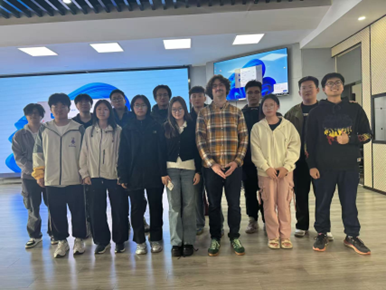
A cheerful group photo with Dr. Kębłowski after an inspiring talk — learning, laughter, and new ideas all in one frame.
A takeaway from students:
Xianqi Dai “Dr. Kębłowski’s lecture made me realize that transport planning is not just about designing roads and metros, but about designing fairness. Understanding who benefits and who struggles in our systems helps us create mobility that truly serves everyone.”
Ruiheng Li “What struck me most was the idea that a smart city must also be a just city. The discussion about informal mobility in Xi’an showed how innovation can emerge from everyday practices, not only from technology or data.”
Kangrui Jia “As a future planner, I found the lecture inspiring because it challenged the way I think about success in transport projects. Efficiency matters, but inclusion and empathy define real progress.”